

Could micro-insurance help the poorest communities deal with climate change? When the largest cyclone ever recorded hit the Philippines and forced the evacuation of thousands of people on Friday, it no doubt laid waste to huge swaths of agriculture.
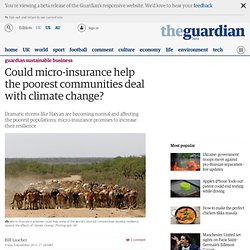
Typhoon Haiyan's 195mph sustained winds and five-meter-high waves threatened much of the Pacific nation, yet after threatening life and limb, they may have done the most damage to the estimated 87% of Filipinos who lack insurance. The role of insurance Dramatic storms like Haiyan may represent the new normal, which is partly why the global insurance industry and civil society organisations are turning to programmes such as MicroEnsure and the Coop Life Insurance and Mutual Benefit Services. These kind of insurance schemes linked to climate indices, are not to specific headline-grabbing catastrophes, but the ongoing damage global climate change is doing to rural economies.
Climate resilience Individual farmers don't have to prove their losses. Public-private partnerships are another key piece. Motivations differ. Bitcoin Pursues the Mainstream. How The Netherlands Became The Biggest Exporter Of Resilience. Huib de Vriend was five years old when the great flood of 1953 hit.
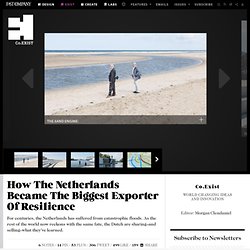
Body Parts for Sale by Desperate U.S. Workers. Out of work for more than two years and faced with eviction, April Hare needed cash.
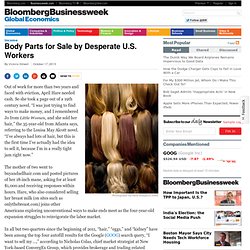
So she took a page out of a 19th century novel. “I was just trying to find ways to make money, and I remembered Jo from Little Women, and she sold her hair,” the 35-year-old from Atlanta says, referring to the Louisa May Alcott novel. “I’ve always had lots of hair, but this is the first time I’ve actually had the idea to sell it, because I’m in a really tight jam right now.” The mother of two went to buyandsellhair.com and posted pictures of her 18-inch mane, asking for at least $1,000 and receiving responses within hours. Hare, who also considered selling her breast milk (on sites such as onlythebreast.com) joins other Americans exploring unconventional ways to make ends meet as the four-year-old expansion struggles to reinvigorate the labor market. Kidneys are a different matter. The Internet is responsible for much of the increased interest in cashing in on body parts, Becker says.
Welcome To The Solution Economy. Imagine the world if we were able to double, triple, or even quadruple the number of problem solvers, the diversity of solutions, and the scale of social impacts.
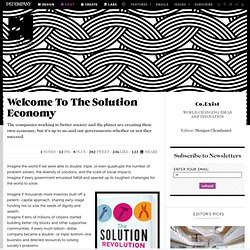
Imagine if every government emulated NASA and opened up its toughest challenges for the world to solve. Imagine if thousands more investors built off a patient- capital approach, sharing early-stage funding risk to sow the seeds of dignity and wealth. Imagine if tens of millions of citizens started building better city blocks and other supportive communities; if every multi-billion- dollar company became a double- or triple-bottom-line business and directed resources to solving society’s problems.
Imagine if the number of social enterprises tripled and thousands of them had the size and scale to spread their innovations across continents. We’ve started down the road to such a world. Cultivating A Solution Economy What accelerates the solution economy? Red Tape Vs. Why Money Will Soon Be Extinct. Since the financial crisis of 2008, people have questioned how much trust they should place in large banks and financial institutions.
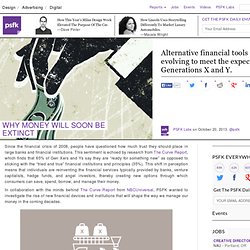
This sentiment is echoed by research from The Curve Report, which finds that 65% of Gen Xers and Ys say they are “ready for something new” as opposed to sticking with the “tried and true” financial institutions and principles (35%). This shift in perception means that individuals are reinventing the financial services typically provided by banks, venture capitalists, hedge funds, and angel investors, thereby creating new options through which consumers can save, spend, borrow, and manage their money. In collaboration with the minds behind The Curve Report from NBCUniversal, PSFK wanted to investigate the rise of new financial devices and institutions that will shape the way we manage our money in the coming decades. Alternative financial models have already gained strong traction among Gen Xers and Ys. The Curve Report from NBCUniversal Fast Finance. Banks put a price on Earth's life support.
Aug. 30, 2013 Water, forests and other natural resources are being used unsustainably, so some of the world's largest banks plan to cut credit for companies that rely on but fail to value those assets.
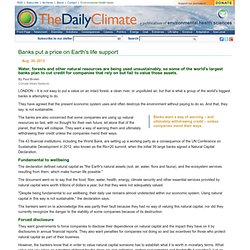
By Paul BrownClimate News Network LONDON – It is not easy to put a value on an intact forest, a clean river, or unpolluted air, but that is what a group of the world's biggest banks is attempting to do. They have agreed that the present economic system uses and often destroys the environment without paying to do so. And that, they say, is not sustainable. Banks want a way of warning – and ultimately withdrawing credit – unless companies mend their ways. The banks are also concerned that some companies are using up natural resources so fast, with no thought for their own future, let alone that of the planet, that they will collapse. Fundamental to wellbeing "Despite being fundamental to our wellbeing, their daily use remains almost undetected within our economic system.
Forced disclosure.